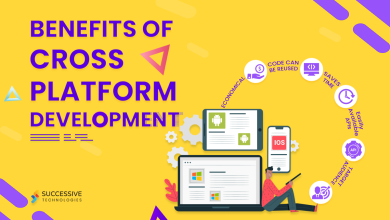
What is the Future of IoT and Mobile App Integration for Businesses?
With the advancement in the development of mobile devices, the adoption of coming-of-age technologies like the Internet of Things is becoming more prominent. Many researchers believe that the combination of IoT and mobile app development can significantly reshape the lives of humans. Collectively, these technologies can dominate the future and bring unparalleled experience to enterprises across the niches.
Today, IoT emerges as a central point for businesses looking to navigate digital transformation. The evolution of this technology helps in pushing the mobile app development industry to welcome innovations. Business owners seek to hire a mobile app development company specializing in IoT and other trending technologies to stay on the top. As per a report by Statista, the figure for installed IoT devices will reach around the 30.9 billion mark by 2025.
This article will introduce you to a more profound look that can determine the future of IoT and mobile app integration in the forthcoming years.
IoT and Mobile App Integration: The Futuristic Trends to Focus
In the present era, the significance of integrating mobile apps with IoT is growing by leaps and bounds. With the concept of IoT mobile app development, we can flourish the idea of smart homes, smart cars, and even smart cities quickly. For example, with IoT-integrated mobile apps, you can monitor your security cameras from anywhere, start your car remotely, and do more with one tap.
IoT-integrated apps will necessitate AI
IoT is not just about monitoring conduct. In fact, it is more about the high-speed processing of data and preparing it for precise predictions. That’s why it has become crucial for business owners to manage, observe and analyze their massive amount of data. Primarily, it focuses on the capability of IoT to link with Machine Learning (ML) and Artificial Intelligence (AI).
In the upcoming future, organizations, businesses, and users will rely on IoT and AI-enabled mobile applications due to their connectivity. The combination of AI and IoT is robust enough to enhance the mobile app performance and deliver a personalized and interactive user experience. Some of the famous instances of existing IoT services collaborated with AI are Alexa, Google AI and Siri, which can easily describe the future possibilities of AI-integrated IoT mobile applications.
Enhanced data security while pairing with auto ML
Data security concerns can arise when you connect various smartphones or other mobile devices across different operating systems in the IoT surroundings. Moreover, since data breaching is too common nowadays, modern businesses make massive investments in IoT-enabled mobile apps for improved security. As per many IoT gourmets, several companies will integrate ML models in their application systems for enhanced data security.
According to industry experts, ML will become automated, allowing businesses to acquire an entirely new set of protection measures. These apps will have ML toolkits to perform highly flexible and scalable tasks on big data to improve data security.
Growth in the mobile app utilization in industrial IoT
Today, mobile apps play a crucial role in powering the Industrial Internet of Things (IIoT). It helped in transforming the way manufacturers operate their factories and companies. In the words of some industry analysts, it will be the industrial sector (such as manufacturing, logistics, and warehousing) from where there will be the highest demand for IoT apps. With the help of mobile app development companies, product owners can get more customized solutions to cater to their business requirements.
A rise in the usage of wearable IoT mobile applications
Smartwatches and other wearables that can seamlessly interact with smartphones via a mobile app are becoming a trend. Wearable applications like fitness trackers, smart homes, smart eyewear, etc., fall under the broad umbrella of IoT apps. The leading tech giants, Google and Apple, have been using IoT solutions for their wearable products for a long time, such as smart lenses and iWatch. The technological experts suggest that wearables are crucial phases of IoT-based devices that can take the IoT market to an entirely new level.
A broader scope of hybrid app development
There is no mistake in saying that hybrid applications are the future of mobile app development. Conventional mobile applications are platform-dependent; they run on a specific platform that is not suitable for IoT apps. However, IoT-based mobile apps can not be platform-specified. Moreover, hybrid apps work on multiple platforms, which means the end-users can interact with multi-platform devices. Due to this, hybrid app development is highly suitable for IoT mobile apps. With IoT, hybrid mobile app developers receive the advantages of advanced code capabilities, enabling them to reuse a massive section of code across multiple platforms.
Wrapping Up
With the expansion of connected devices, the relationship between IoT and mobile apps is also boosting. Moreover, with this advancement, this bond between the two technologies will probably flourish and highly influence the business world in the upcoming years.
If you are a business owner looking to integrate IoT into your mobile business app, it will be better to consult a professional mobile app development agency dealing with IoT. IoT mobile app development is not just a trend or concept; it holds the power to revolutionize the business perspective in the future.





